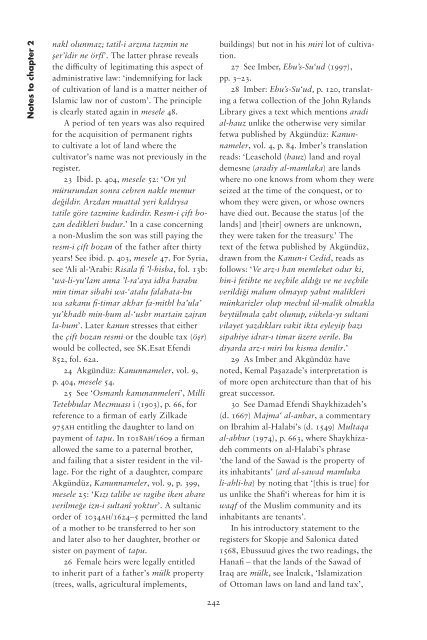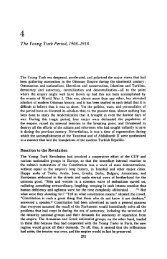Governing property, making the modern state - PSI424
Governing property, making the modern state - PSI424
Governing property, making the modern state - PSI424
Create successful ePaper yourself
Turn your PDF publications into a flip-book with our unique Google optimized e-Paper software.
Notes to chapter 2<br />
nakl olunmaz; tatil-i arzına tazmin ne<br />
şer’îdir ne örfî’. The latter phrase reveals<br />
<strong>the</strong> difficulty of legitimating this aspect of<br />
administrative law: ‘indemnifying for lack<br />
of cultivation of land is a matter nei<strong>the</strong>r of<br />
Islamic law nor of custom’. The principle<br />
is clearly <strong>state</strong>d again in mesele 48.<br />
A period of ten years was also required<br />
for <strong>the</strong> acquisition of permanent rights<br />
to cultivate a lot of land where <strong>the</strong><br />
cultivator’s name was not previously in <strong>the</strong><br />
register.<br />
23 Ibid. p. 404, mesele 52: ‘On yıl<br />
mürurundan sonra cebren nakle memur<br />
değildir. Arzdan muattal yeri kaldıysa<br />
tatile göre tazmine kadirdir. Resm-i çift bozan<br />
dedikleri budur.’ In a case concerning<br />
a non-Muslim <strong>the</strong> son was still paying <strong>the</strong><br />
resm-i çift bozan of <strong>the</strong> fa<strong>the</strong>r after thirty<br />
years! See ibid. p. 403, mesele 47. For Syria,<br />
see ‘Ali al-‘Arabi: Risala fi ’l-hisba, fol. 13b:<br />
‘wa-li-yu‘lam anna ’l-ra‘aya idha harabu<br />
min timar sibahi wa-‘atalu falahata-hu<br />
wa sakanu fi-timar akhar fa-mithl ha’ula’<br />
yu’khadh min-hum al-‘ushr martain zajran<br />
la-hum’. Later kanun stresses that ei<strong>the</strong>r<br />
<strong>the</strong> çift bozan resmi or <strong>the</strong> double tax (öşr)<br />
would be collected, see SK.Esat Efendi<br />
852, fol. 62a.<br />
24 Akgündüz: Kanunnameler, vol. 9,<br />
p. 404, mesele 54.<br />
25 See ‘Osmanlı kanunanmeleri’, Milli<br />
Tetebbular Mecmuası i (1903), p. 66, for<br />
reference to a firman of early Zilkade<br />
975AH entitling <strong>the</strong> daughter to land on<br />
payment of tapu. In 1018AH/1609 a firman<br />
allowed <strong>the</strong> same to a paternal bro<strong>the</strong>r,<br />
and failing that a sister resident in <strong>the</strong> village.<br />
For <strong>the</strong> right of a daughter, compare<br />
Akgündüz, Kanunnameler, vol. 9, p. 399,<br />
mesele 25: ‘Kızı talibe ve ragibe iken ahare<br />
verilmeğe izn-i sultanî yoktur’. A sultanic<br />
order of 1034AH/1624–5 permitted <strong>the</strong> land<br />
of a mo<strong>the</strong>r to be transferred to her son<br />
and later also to her daughter, bro<strong>the</strong>r or<br />
sister on payment of tapu.<br />
26 Female heirs were legally entitled<br />
to inherit part of a fa<strong>the</strong>r’s mülk <strong>property</strong><br />
(trees, walls, agricultural implements,<br />
242<br />
buildings) but not in his miri lot of cultivation.<br />
27 See Imber, Ebu’s-Su‘ud (1997),<br />
pp. 3–23.<br />
28 Imber: Ebu’s-Su‘ud, p. 120, translating<br />
a fetwa collection of <strong>the</strong> John Rylands<br />
Library gives a text which mentions aradi<br />
al-hauz unlike <strong>the</strong> o<strong>the</strong>rwise very similar<br />
fetwa published by Akgündüz: Kanunnameler,<br />
vol. 4, p. 84. Imber’s translation<br />
reads: ‘Leasehold (hauz) land and royal<br />
demesne (aradiy al-mamlaka) are lands<br />
where no one knows from whom <strong>the</strong>y were<br />
seized at <strong>the</strong> time of <strong>the</strong> conquest, or to<br />
whom <strong>the</strong>y were given, or whose owners<br />
have died out. Because <strong>the</strong> status [of <strong>the</strong><br />
lands] and [<strong>the</strong>ir] owners are unknown,<br />
<strong>the</strong>y were taken for <strong>the</strong> treasury.’ The<br />
text of <strong>the</strong> fetwa published by Akgündüz,<br />
drawn from <strong>the</strong> Kanun-i Cedid, reads as<br />
follows: ‘Ve arz-ı han memleket odur ki,<br />
hin-i fetihte ne veçhile aldığı ve ne veçhile<br />
verildiği malum olmayıp yahut malikleri<br />
münkarizler olup mechul ül-malik olmakla<br />
beytülmala zabt olunup, vükela-yı sultani<br />
vilayet yazdıkları vakit ikta eyleyip bazı<br />
sipahiye idrar-ı timar üzere verile. Bu<br />
diyarda arz-ı miri bu kisma denilir.’<br />
29 As Imber and Akgündüz have<br />
noted, Kemal Paşazade’s interpretation is<br />
of more open architecture than that of his<br />
great successor.<br />
30 See Damad Efendi Shaykhizadeh’s<br />
(d. 1667) Majma‘ al-anhar, a commentary<br />
on Ibrahim al-Halabi’s (d. 1549) Multaqa<br />
al-abhur (1974), p. 663, where Shaykhizadeh<br />
comments on al-Halabi’s phrase<br />
‘<strong>the</strong> land of <strong>the</strong> Sawad is <strong>the</strong> <strong>property</strong> of<br />
its inhabitants’ (ard al-sawad mamluka<br />
li-ahli-ha) by noting that ‘[this is true] for<br />
us unlike <strong>the</strong> Shafi‘i whereas for him it is<br />
waqf of <strong>the</strong> Muslim community and its<br />
inhabitants are tenants’.<br />
In his introductory <strong>state</strong>ment to <strong>the</strong><br />
registers for Skopje and Salonica dated<br />
1568, Ebussuud gives <strong>the</strong> two readings, <strong>the</strong><br />
Hanafi – that <strong>the</strong> lands of <strong>the</strong> Sawad of<br />
Iraq are mülk, see İnalcık, ‘Islamization<br />
of Ottoman laws on land and land tax’,












